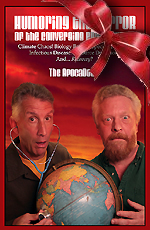SEARCH
A great gift
for crisis deniers!

Humoring the Horror of the
Converging Emergencies
94 color pages
$24.99 now $15!
Or read FREE online!

Twitter

Ping this story
in social media:
del.icio.us
Digg
Newsvine
NowPublic
Reddit
Facebook
StumbleUpon
|
 |
|
 |
|
 |
|
 |
|
Antibacterial products fuel resistant bacteria in streams and rivers http://apocadocs.com/s.pl?1380661711
Invented for surgeons in the 1960s, triclosan slows or stops the growth of bacteria, fungi, and mildew. Currently, around half of liquid soaps contain the chemical, as well as toothpastes, deodorants, cosmetics, liquid cleansers, and detergents. Triclosan enters streams and rivers through domestic wastewater, leaky sewer infrastructure, and sewer overflows, with residues now common throughout the United States.
Emma Rosi-Marshall, one of the paper's authors and an aquatic ecologist at the Cary Institute of Ecosystem Studies in Millbrook, New York explains: "The bacterial resistance caused by triclosan has real environmental consequences. Not only does it disrupt aquatic life by changing native bacterial communities, but it's linked to the rise of resistant bacteria that could diminish the usefulness of important antibiotics."
|
|
 |
|
 |
|
 |
[Read more stories about:
antibiotic resistance, unintended consequences, contamination]
|
 |
|
New!:
| |
|
No reader quips yet -- be the first! | |
|
Got a PaniQuip?
|
|
|
We reserve the
right to reuse, remove, or refuse any entry.
| |
|
 |
'Doc Jim says:
|
 |
 |
 |
I think it's time to declare war on bacteria.
|
|
|
|
 |
Want to explore more?
Try the PaniCloud!
|










